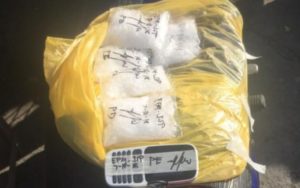News
‘Shabu’ seized in Manila port, recent ops have same profile: PDEA

“Malaysia and Vietnam were only used as transshipment points. The shipments may have different points of origin, but we cannot deny (that) the intercepted illegal drugs came from the same source.” (File Photo by City Mayor’s Office via PNA)
MANILA — The Philippine Drug Enforcement Agency (PDEA) on Wednesday reiterated that samples from the intercepted “shabu” (crystal meth) shipment at the Manila International Container Port (MICP) and evidence seized from recent anti-drug operations have the same profile.
“Same profile of drug samples means same source, same manufacturer, and same method used in the production of the illegal drug.
We are confident that the newfound scientific evidence will corroborate our claim that large amounts of shabu from the emptied magnetic lifters in a warehouse in GMA, Cavite, are circulating in our streets,” PDEA Director General Aaron N. Aquino said in a statement.
Based on investigation, the shabu came from Taiwan, while Malaysia was the transshipment point.
Chinese syndicates operating in the Golden Triangle Area of Southeast Asia (Thailand, Laos and Myanmar) are believed to be responsible for the illegal drug shipment.
Consigned to Vecaba Trading, the intercepted MICP shabu shipment came from Malaysia, while the emptied lifters found in GMA, Cavite were smuggled in through a consignee-for-hire, SMYD Trading, with Vietnam as the country of origin, Aquino said.
“Malaysia and Vietnam were only used as transshipment points. The shipments may have different points of origin, but we cannot deny (that) the intercepted illegal drugs came from the same source,” he said.
Four persons of interest, including two Chinese nationals linked to the intercepted shipment in MICP, are now facing charges before the Office of the State Prosecutor, Manila.
One of the foreign respondents was implicated in the case for his involvement as an alleged consignee through Vecaba Trading, according to the records provided by Benline Agencies Philippines, Inc., which acted as the local agent in facilitating the shipment of the intercepted shabu cargo.
According to Aquino, the respondent’s given address, Unit 4, Lot 1-8, CRS Subdivision, Barangay F. Reyes, GMA, Cavite, and the address of the warehouse where the four magnetic lifters were abandoned is the same.
Impurity drug profiling is a scientific tool that applies chemical and physical techniques to determine if a relation exists between illicit drug seizures and the significance of such relationship.
A similarity match or strong correlation of samples, where the correlation value is greater or equal to 0.98 (range is 0.98-1.0) obtained from a statistical tool and cluster analysis, means they came from the same manufacturer and same method of production.
Profiling analysis between samples from the intercepted shipment in MICP and bulk shabu seizures from recent entrapment operations conducted by PDEA in Sitio Tenorio, Barangay Awang DOS, Maguindanao; along Congressional Ave., Barangay Bahay Toro, Quezon City; along Ronquillo St.
, Sta. Cruz, Manila; and in Alabang Town Center, Muntinlupa, showed that the impurity patterns are of high similarity, where the correlation value between samples is 0.999.
The procedure undertaken by the PDEA Laboratory Service for the profiling of shabu is similar to the one established and validated by the United Nations Office on Drugs and Crime (UNODC).
The same software used for the statistical data analysis of impurity patterns is also used in drug forensic development in Japan, and was introduced by the Japan International Cooperation Agency (JICA) to PDEA.
As a matter of policy and practice, PDEA Laboratory Service has been conducting impurity drug profiling since March 2014, pursuant to Section 4e of Dangerous Drugs Board (DDB) Regulation No. 1 Series of 2002.
“PDEA wishes to clarify that the agency is just proving a point. We are not doing this to discredit any counterpart agencies but rather only to support our claims that we believe shabu supply is abundant mainly because the illegal drugs are similar to the one recovered from the magnetic lifters at MICP, as impurity profiling revealed,” the PDEA chief noted.





















